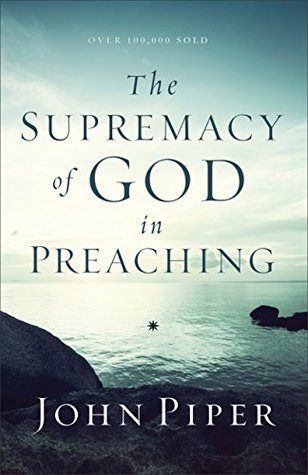More on this book
Kindle Notes & Highlights
Robert Murray M’Cheyne said, “What my people need most is my personal holiness.”1 That’s right. But human holiness is nothing other than a God-besotted life—the living out of a God-entranced worldview.
Once, while visiting the continent, Spurgeon was asked about the secret of his ministry. After a moment’s pause Mr. Spurgeon said, “My people pray for me.”
For God aims to exalt himself, not the preacher, in this affair of preaching. And that brings us to the theme: the supremacy of God in preaching. Its outline is intentionally Trinitarian: The Goal of Preaching: The Glory of God The Ground of Preaching: The Cross of Christ The Gift of Preaching: The Power of the Holy Spirit
My burden in these pages is to plead for the supremacy of God in preaching—that the dominant note of preaching be the freedom of God’s sovereign grace, that the unifying theme be the zeal that God has for his own glory, that the grand object of preaching be the infinite and inexhaustible being of God, and that the pervasive atmosphere of preaching be the holiness of God.
What does the preacher herald? What is the good news referred to here? Since verse 16 is a quotation of Isaiah 52:7, we do well to go back and let Isaiah define it for us. Listen for what Cotton Mather heard in this verse concerning the great design of Christian preaching. How beautiful upon the mountains are the feet of him who brings good news, who publishes peace, who brings good news of happiness, who publishes salvation, who says to Zion, “Your God reigns.” The good tidings of the preacher, the peace and salvation that he publishes, are boiled down into one sentence: “Your God reigns!”
Isaiah gives the answer in an earlier text, Isaiah 48:9–11. Speaking of his mercy to Israel, God says: For my name’s sake I defer my anger, for the sake of my praise I restrain it for you, that I may not cut you off. Behold, I have refined you, but not as silver; I have tried you in the furnace of affliction. For my own sake, for my own sake, I do it, for how should my name be profaned? My glory I will not give to another. Behind and beneath the sovereign exercises of God’s mercy as king is an unwavering passion for the honor of his name and the display of his glory.
The only submission that fully reflects the worth and glory of the king is glad submission. Begrudging submission berates the king. No gladness in the subject, no glory to the king.
And the supremacy of God in preaching is secured by this fact: The one who satisfies gets the glory; the one who gives the pleasure is the treasure.
in our proud love affair with ourselves, we pour contempt (whether we know it or not!) on the worth of God’s glory. And as our pride pours contempt upon God’s glory, his righteousness obliges him to pour wrath upon our pride.
Man-centered humans are amazed that God should withhold life and joy from his creatures. But the God-centered Bible is amazed that God should withhold judgment from sinners.
What the text teaches is that—even though all scorn the glory of God (according to Rom. 3:23), and even though God’s righteousness is his unwavering commitment to uphold that glory (implied in 3:25)—nevertheless, God designed a way to vindicate the worth of his glory and at the same time give hope to sinners who have scorned that glory—and what he designed was the death of his Son. It took the infinitely costly death of the Son of God to repair the dishonor that my pride has brought upon the glory of God.


